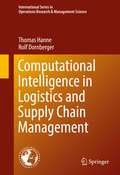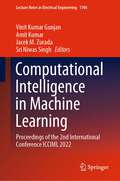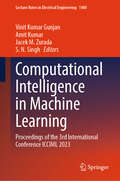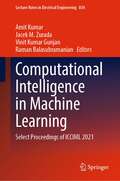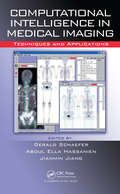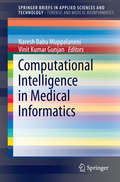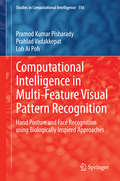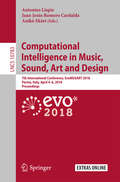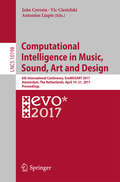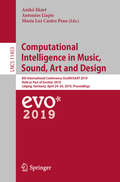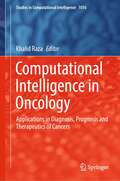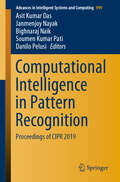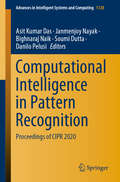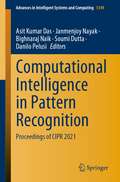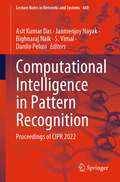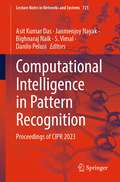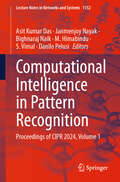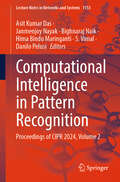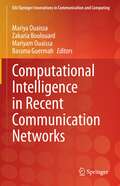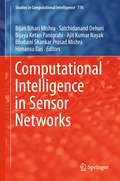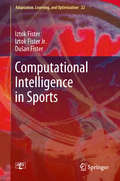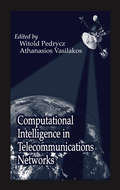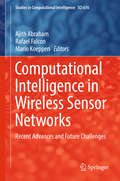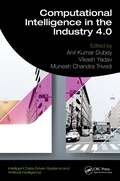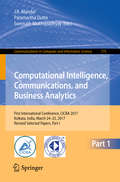- Table View
- List View
Computational Intelligence in Logistics and Supply Chain Management (International Series in Operations Research & Management Science #244)
by Thomas Hanne Rolf DornbergerThis book deals with complex problems in the fields of logistics and supply chain management and discusses advanced methods, especially from the field of computational intelligence (CI), for solving them. The first two chapters provide general introductions to logistics and supply chain management on the one hand, and to computational intelligence on the other hand. The subsequent chapters cover specific fields in logistics and supply chain management, work out the most relevant problems found in those fields, and discuss approaches for solving them. Chapter 3 discusses problems in the field of production and inventory management. Chapter 4 considers planning activities on a finer level of granularity which is usually denoted as scheduling. In chapter 5 problems in transportation planning such as different types of vehicle routing problems are considered. While chapters 3 to 5 rather discuss planning problems which appear on an operative level, chapter 6 discusses the strategic problem of designing a supply chain or network. The final chapter provides an overview of academic and commercial software and information systems for the discussed applications. There appears to be a gap between general textbooks on logistics and supply chain management and more specialized literature dealing with methods for computational intelligence, operations research, etc. , for solving the complex operational problems in these fields. For readers, it is often difficult to proceed from introductory texts on logistics and supply chain management to the sophisticated literature which deals with the usage of advanced methods. This book fills this gap by providing state-of-the-art descriptions of the corresponding problems and suitable methods for solving them.
Computational Intelligence in Machine Learning: Proceedings of the 2nd International Conference ICCIML 2022 (Lecture Notes in Electrical Engineering #1106)
by Amit Kumar Vinit Kumar Gunjan Jacek M. Zurada Sri Niwas SinghThis volumes comprises select proceedings of the International Conference on Computational Intelligence in Machine Learning (ICCIML 2022). The contents cover latest research trends and developments in the areas of machine learning, smart cities, IoT, Artificial Intelligence, cyber physical systems, cybernetics, data science, neural network, cognition, among others. It also addresses the comprehensive nature of computational intelligence, AI, ML and DL to emphasize its character in modelling, identification, optimization, prediction, forecasting, and control of future intelligent systems. This volume will be a useful guide to those working as researchers in academia and industry by presenting in-depth fundamental research contributions from a methodological/application perspective in understanding Artificial intelligence and machine learning approaches and their capabilities in solving diverse range of problems in industries and its real-world applications.
Computational Intelligence in Machine Learning: Proceedings of the 3rd International Conference ICCIML 2023 (Lecture Notes in Electrical Engineering #1400)
by Amit Kumar Vinit Kumar Gunjan Jacek M. Zurada S. N. SinghThis book features selected proceedings from the International Conference on Computational Intelligence in Machine Learning (ICCIML 2023). It covers the latest research trends and developments in various fields, including machine learning, smart cities, the Internet of Things (IoT), artificial intelligence, cyber-physical systems, cybernetics, data science, neural networks, and cognition, among others. The book also emphasizes the comprehensive nature of computational intelligence, artificial intelligence, machine learning, and deep learning by highlighting their roles in modeling, identification, optimization, prediction, forecasting, and controlling future intelligent systems. This volume serves as a valuable resource for researchers in both academia and industry, offering in-depth insights from fundamental research contributions. It focuses on methodological and application perspectives, enhancing the understanding of AI and ML approaches and their capabilities in addressing a diverse range of problems across various industries and real-world applications.
Computational Intelligence in Machine Learning: Select Proceedings of ICCIML 2021 (Lecture Notes in Electrical Engineering #834)
by Amit Kumar Vinit Kumar Gunjan Jacek M. Zurada Raman BalasubramanianThe book includes select proceedings of the International Conference on Computational Intelligence in Machine Learning (ICCIML 2021). The book constitutes peer-reviewed papers on machine learning, computational intelligence, the internet of things, and smart city applications emphasizing multi-disciplinary research in artificial intelligence and cyber-physical systems. This book addresses the comprehensive nature of computational intelligence, artificial intelligence, machine learning, and deep learning to emphasize its character in modeling, identification, optimization, prediction, forecasting, and control of future intelligent systems. The book will be useful for researchers, research scholars, and students to formulate their research ideas and find future directions in these areas. It will help the readers to solve a diverse range of problems in industries and their real-world applications.
Computational Intelligence in Medical Imaging: Techniques and Applications
by Gerald Schaefer Aboul Ella Hassanien Jianmin JiangCI Techniques & Algorithms for a Variety of Medical Imaging SituationsDocuments recent advances and stimulates further researchA compilation of the latest trends in the field, Computational Intelligence in Medical Imaging: Techniques and Applications explores how intelligent computing can bring enormous benefit to existing technology in medical
Computational Intelligence in Medical Informatics (SpringerBriefs in Applied Sciences and Technology)
by Vinit Kumar Gunjan Naresh Babu MuppalaneniThis Brief highlights Informatics and related techniques to Computer Science Professionals, Engineers, Medical Doctors, Bioinformatics researchers and other interdisciplinary researchers. Chapters include the Bioinformatics of Diabetes and several computational algorithms and statistical analysis approach to effectively study the disorders and possible causes along with medical applications.
Computational Intelligence in Multi-Feature Visual Pattern Recognition: Hand Posture and Face Recognition using Biologically Inspired Approaches (Studies in Computational Intelligence #556)
by Pramod Kumar Pisharady Prahlad Vadakkepat Loh Ai PohThis book presents a collection of computational intelligence algorithms that addresses issues in visual pattern recognition such as high computational complexity, abundance of pattern features, sensitivity to size and shape variations and poor performance against complex backgrounds. The book has 3 parts. Part 1 describes various research issues in the field with a survey of the related literature. Part 2 presents computational intelligence based algorithms for feature selection and classification. The algorithms are discriminative and fast. The main application area considered is hand posture recognition. The book also discusses utility of these algorithms in other visual as well as non-visual pattern recognition tasks including face recognition, general object recognition and cancer / tumor classification. Part 3 presents biologically inspired algorithms for feature extraction. The visual cortex model based features discussed have invariance with respect to appearance and size of the hand, and provide good inter class discrimination. A Bayesian model of visual attention is described which is effective in handling complex background problem in hand posture recognition. The book provides qualitative and quantitative performance comparisons for the algorithms outlined, with other standard methods in machine learning and computer vision. The book is self-contained with several figures, charts, tables and equations helping the reader to understand the material presented without instruction.
Computational Intelligence in Music, Sound, Art and Design
by Antonios Liapis Juan Jesús Romero Cardalda Anikó EkártThis book constitutes the refereed proceedings of the 7th International Conference on Evolutionary Computation in Combinatorial Optimization, EvoMUSART 2018, held in Parma, Italy, in April 2018, co-located with the Evo*2017 events EuroGP, EvoCOP and EvoApplications. The 21 revised full papers presented were carefully reviewed and selected from 33 submissions. The papers cover a wide range of topics and application areas, including: generative approaches to music and visual art; medical art therapy; visualization in virtual reality; jewellery design; interactive evolutionary computation; and the art theory of evolutionary computation.
Computational Intelligence in Music, Sound, Art and Design: 6th International Conference, EvoMUSART 2017, Amsterdam, The Netherlands, April 19–21, 2017, Proceedings (Lecture Notes in Computer Science #10198)
by João Correia, Vic Ciesielski and Antonios LiapisThis book constitutes the refereed proceedings of the 6th International Conference on Evolutionary Computation in Combinatorial Optimization, EvoMUSART 2017, held in Amsterdam, The Netherlands, in April 2017, co-located with the Evo*2017 events EuroGP, EvoCOP and EvoApplications. The 24 revised full papers presented were carefully reviewed and selected from 29 submissions. The papers cover a wide range of topics and application areas, including: generative approaches to music, graphics, game content, and narrative; music information retrieval; computational aesthetics; the mechanics of interactive evolutionary computation; computer-aided design; and the art theory of evolutionary computation.
Computational Intelligence in Music, Sound, Art and Design: 8th International Conference, EvoMUSART 2019, Held as Part of EvoStar 2019, Leipzig, Germany, April 24–26, 2019, Proceedings (Lecture Notes in Computer Science #11453)
by Antonios Liapis Anikó Ekárt María Luz Castro PenaThis book constitutes the refereed proceedings of the 8th International Conference on Evolutionary Computation in Combinatorial Optimization, EvoMUSART 2019, held in Leipzig, Germany, in April 2019, co-located with the Evo*2019 events EuroGP, EvoCOP and EvoApplications. The 16 revised full papers presented were carefully reviewed and selected from 24 submissions. The papers cover a wide range of topics and application areas, including: visual art and music generation, analysis, and interpretation; sound synthesis; architecture; video; poetry; design; and other creative tasks.
Computational Intelligence in Oncology: Applications in Diagnosis, Prognosis and Therapeutics of Cancers (Studies in Computational Intelligence #1016)
by Khalid RazaThis book encapsulates recent applications of CI methods in the field of computational oncology, especially cancer diagnosis, prognosis, and its optimized therapeutics. The cancer has been known as a heterogeneous disease categorized in several different subtypes. According to WHO’s recent report, cancer is a leading cause of death worldwide, accounting for over 10 million deaths in the year 2020. Therefore, its early diagnosis, prognosis, and classification to a subtype have become necessary as it facilitates the subsequent clinical management and therapeutics plan. Computational intelligence (CI) methods, including artificial neural networks (ANNs), fuzzy logic, evolutionary computations, various machine learning and deep learning, and nature-inspired algorithms, have been widely utilized in various aspects of oncology research, viz. diagnosis, prognosis, therapeutics, and optimized clinical management. Appreciable progress has been made toward the understanding the hallmarks of cancer development, progression, and its effective therapeutics. However, notwithstanding the extrinsic and intrinsic factors which lead to drastic increment in incidence cases, the detection, diagnosis, prognosis, and therapeutics remain an apex challenge for the medical fraternity. With the advent in CI-based approaches, including nature-inspired techniques, and availability of clinical data from various high-throughput experiments, medical consultants, researchers, and oncologists have seen a hope to devise and employ CI in various aspects of oncology. The main aim of the book is to occupy state-of-the-art applications of CI methods which have been derived from core computer sciences to back medical oncology. This edited book covers artificial neural networks, fuzzy logic and fuzzy inference systems, evolutionary algorithms, various nature-inspired algorithms, and hybrid intelligent systems which are widely appreciated for the diagnosis, prognosis, and optimization of therapeutics of various cancers. Besides, this book also covers multi-omics exploration, gene expression analysis, gene signature identification of cancers, genomic characterization of tumors, anti-cancer drug design and discovery, drug response prediction by means of CI, and applications of IoT, IoMT, and blockchain technology in cancer research.
Computational Intelligence in Pattern Recognition: Proceedings of CIPR 2019 (Advances in Intelligent Systems and Computing #999)
by Janmenjoy Nayak Bighnaraj Naik Asit Kumar Das Soumen Kumar Pati Danilo PelusiThis book presents practical development experiences in different areas of data analysis and pattern recognition, focusing on soft computing technologies, clustering and classification algorithms, rough set and fuzzy set theory, evolutionary computations, neural science and neural network systems, image processing, combinatorial pattern matching, social network analysis, audio and video data analysis, data mining in dynamic environments, bioinformatics, hybrid computing, big data analytics and deep learning. It also provides innovative solutions to the challenges in these areas and discusses recent developments.
Computational Intelligence in Pattern Recognition: Proceedings of CIPR 2020 (Advances in Intelligent Systems and Computing #1120)
by Janmenjoy Nayak Bighnaraj Naik Asit Kumar Das Soumi Dutta Danilo PelusiThis book features high-quality research papers presented at the 2nd International Conference on Computational Intelligence in Pattern Recognition (CIPR 2020), held at the Institute of Engineering and Management, Kolkata, West Bengal, India, on 4–5 January 2020. It includes practical development experiences in various areas of data analysis and pattern recognition, focusing on soft computing technologies, clustering and classification algorithms, rough set and fuzzy set theory, evolutionary computations, neural science and neural network systems, image processing, combinatorial pattern matching, social network analysis, audio and video data analysis, data mining in dynamic environments, bioinformatics, hybrid computing, big data analytics and deep learning. It also provides innovative solutions to the challenges in these areas and discusses recent developments.
Computational Intelligence in Pattern Recognition: Proceedings of CIPR 2021 (Advances in Intelligent Systems and Computing #1349)
by Janmenjoy Nayak Bighnaraj Naik Asit Kumar Das Soumi Dutta Danilo PelusiThis book features high-quality research papers presented at the 3rd International Conference on Computational Intelligence in Pattern Recognition (CIPR 2021), held at the Institute of Engineering and Management, Kolkata, West Bengal, India, on 24 – 25 April 2021. It includes practical development experiences in various areas of data analysis and pattern recognition, focusing on soft computing technologies, clustering and classification algorithms, rough set and fuzzy set theory, evolutionary computations, neural science and neural network systems, image processing, combinatorial pattern matching, social network analysis, audio and video data analysis, data mining in dynamic environments, bioinformatics, hybrid computing, big data analytics and deep learning. It also provides innovative solutions to the challenges in these areas and discusses recent developments.
Computational Intelligence in Pattern Recognition: Proceedings of CIPR 2022 (Lecture Notes in Networks and Systems #480)
by Janmenjoy Nayak Bighnaraj Naik Asit Kumar Das Danilo Pelusi S. VimalThis book features high-quality research papers presented at the 4th International Conference on Computational Intelligence in Pattern Recognition (CIPR 2022), held at Indian Institute of Engineering Science and Technology, Shibpur, Howrah, West Bengal, India, during 23 – 24 April 2022. It includes practical development experiences in various areas of data analysis and pattern recognition, focusing on soft computing technologies, clustering and classification algorithms, rough set and fuzzy set theory, evolutionary computations, neural science and neural network systems, image processing, combinatorial pattern matching, social network analysis, audio and video data analysis, data mining in dynamic environments, bioinformatics, hybrid computing, big data analytics and deep learning. It also provides innovative solutions to the challenges in these areas and discusses recent developments.
Computational Intelligence in Pattern Recognition: Proceedings of CIPR 2023 (Lecture Notes in Networks and Systems #725)
by Janmenjoy Nayak Bighnaraj Naik Asit Kumar Das Danilo Pelusi S. VimalThis book features high-quality research papers presented at the 5th International Conference on Computational Intelligence in Pattern Recognition (CIPR 2023), held at Department of Computer Science and Engineering, Techno Main Salt Lake, West Bengal, India, during May 27–28, 2023. It includes practical development experiences in various areas of data analysis and pattern recognition, focusing on soft computing technologies, clustering and classification algorithms, rough set and fuzzy set theory, evolutionary computations, neural science and neural network systems, image processing, combinatorial pattern matching, social network analysis, audio and video data analysis, data mining in dynamic environments, bioinformatics, hybrid computing, big data analytics, and deep learning. It also provides innovative solutions to the challenges in these areas and discusses recent developments.
Computational Intelligence in Pattern Recognition: Proceedings of CIPR 2024, Volume 1 (Lecture Notes in Networks and Systems #1152)
by Janmenjoy Nayak Bighnaraj Naik Asit Kumar Das Danilo Pelusi S. Vimal M. HimabinduThis book features high-quality research papers presented at the 6th International Conference on Computational Intelligence in Pattern Recognition (CIPR 2024), held at Maharaja Sriram Chandra Bhanja Deo University (MSCB University), Baripada, Odisha, India, during March 15–16, 2024. It includes practical development experiences in various areas of data analysis and pattern recognition, focusing on soft computing technologies, clustering and classification algorithms, rough set and fuzzy set theory, evolutionary computations, neural science and neural network systems, image processing, combinatorial pattern matching, social network analysis, audio and video data analysis, data mining in dynamic environments, bioinformatics, hybrid computing, big data analytics, and deep learning. It also provides innovative solutions to the challenges in these areas and discusses recent developments.
Computational Intelligence in Pattern Recognition: Proceedings of CIPR 2024, Volume 2 (Lecture Notes in Networks and Systems #1153)
by Janmenjoy Nayak Bighnaraj Naik Asit Kumar Das Danilo Pelusi S. Vimal Hima Bindu MaringantiThis book features high-quality research papers presented at the 6th International Conference on Computational Intelligence in Pattern Recognition (CIPR 2024), held at Maharaja Sriram Chandra Bhanja Deo University (MSCB University), Baripada, Odisha, India, during March 15–16, 2024. It includes practical development experiences in various areas of data analysis and pattern recognition, focusing on soft computing technologies, clustering and classification algorithms, rough set and fuzzy set theory, evolutionary computations, neural science and neural network systems, image processing, combinatorial pattern matching, social network analysis, audio and video data analysis, data mining in dynamic environments, bioinformatics, hybrid computing, big data analytics, and deep learning. It also provides innovative solutions to the challenges in these areas and discusses recent developments.
Computational Intelligence in Recent Communication Networks (EAI/Springer Innovations in Communication and Computing)
by Mariya Ouaissa Zakaria Boulouard Mariyam Ouaissa Bassma GuermahThis book focuses on the use of Artificial Intelligence and Machine Learning (AI/ML) based techniques to solve issues related to communication networks, their layers, as well as their applications. The book first offers an introduction to recent trends regarding communication networks. The authors then provide an overview of theoretical concepts of AI/ML, techniques and protocols used in different layers of communication. Furthermore, this book presents solutions that help analyze complex patterns in user data and ultimately improve productivity. Throughout, AI/ML-based solutions are provided, for topics such as signal detection, channel modeling, resource optimization, routing protocol design, transport layer optimization, user/application behavior prediction, software-defined networking, congestion control, communication network optimization, security, and anomaly detection. The book features chapters from a large spectrum of authors including researchers, students, as well as industrials involved in research and development.
Computational Intelligence in Sensor Networks (Studies in Computational Intelligence #776)
by Bhabani Shankar Prasad Mishra Bijaya Ketan Panigrahi Himansu Das Bijan Bihari Mishra Satchidanand Dehuri Ajit Kumar NayakThis book discusses applications of computational intelligence in sensor networks. Consisting of twenty chapters, it addresses topics ranging from small-scale data processing to big data processing realized through sensor nodes with the help of computational approaches. Advances in sensor technology and computer networks have enabled sensor networks to evolve from small systems of large sensors to large nets of miniature sensors, from wired communications to wireless communications, and from static to dynamic network topology. In spite of these technological advances, sensor networks still face the challenges of communicating and processing large amounts of imprecise and partial data in resource-constrained environments. Further, optimal deployment of sensors in an environment is also seen as an intractable problem. On the other hand, computational intelligence techniques like neural networks, evolutionary computation, swarm intelligence, and fuzzy systems are gaining popularity in solving intractable problems in various disciplines including sensor networks. The contributions combine the best attributes of these two distinct fields, offering readers a comprehensive overview of the emerging research areas and presenting first-hand experience of a variety of computational intelligence approaches in sensor networks.
Computational Intelligence in Sports (Adaptation, Learning, and Optimization #22)
by Iztok Fister Iztok Fister Jr. Dušan FisterThis book presents recent research on computational intelligence (CI) algorithms in the field of sport. In the modern age, information technologies have greatly reduced the need for human effort in the carrying out of many daily tasks. These technologies have radically influenced the lives of humans, and the information society in general. Unfortunately, these advances have brought with them certain negative effects, including the encouragement of sedentary lifestyles and the attendant health problems such as obesity that these engender. Other modern maladies, chiefly cardiovascular disease, diabetes, and cancer, have also been on the increase. Today, sports are virtually the only activity that still connects modern humans to their original lifestyle, which was based on physical motion. This book tears familiarizing sports scientists with the foundations of computational intelligence, while at the same time presenting the problems that have arisen in the training domain to computer scientists. Lastly, the book proposes the use of an Artificial Sports Trainer designed to enhance the training of modern athletes who cannot afford the considerable expense of hiring a human personal trainer. This intelligent system can monitor performance and design and direct appropriate future training, thus promoting both healthy lifestyles and competitive success in athletes.
Computational Intelligence in Telecommunications Networks
by Witold Pedrycz and Athanasios VasilakosTelecommunications has evolved and grown at an explosive rate in recent years and will undoubtedly continue to do so. As its functions, applications, and technology grow, it becomes increasingly complex and difficult, if not impossible, to meet the demands of a global network using conventional computing technologies. Computational intelligence (CI) is the technology of the future-and the future is now. Computational Intelligence in Telecommunications Networks offers an in-depth look at the rapid progress of CI technology and shows its importance in solving the crucial problems of future telecommunications networks. It covers a broad range of topics, from Call Admission Control, congestion control, and QoS-routing for ATM networks, to network design and management, optical, mobile, and active networks, and Intelligent Mobile Agents.Today's telecommunications professionals need a working knowledge of CI to exploit its potential to overcome emerging challenges. The CI community must become acquainted with those challenges to take advantage of the enormous opportunities the telecommunications field offers. This text meets both those needs, clearly, concisely, and with a depth certain to inspire further theoretical and practical advances.
Computational Intelligence in Wireless Sensor Networks: Recent Advances and Future Challenges (Studies in Computational Intelligence #676)
by Ajith Abraham Rafael Falcon Mario KoeppenThis book emphasizes the increasingly important role that Computational Intelligence (CI) methods are playing in solving a myriad of entangled Wireless Sensor Networks (WSN) related problems. The book serves as a guide for surveying several state-of-the-art WSN scenarios in which CI approaches have been employed. The reader finds in this book how CI has contributed to solve a wide range of challenging problems, ranging from balancing the cost and accuracy of heterogeneous sensor deployments to recovering from real-time sensor failures to detecting attacks launched by malicious sensor nodes and enacting CI-based security schemes. Network managers, industry experts, academicians and practitioners alike (mostly in computer engineering, computer science or applied mathematics) benefit from th e spectrum of successful applications reported in this book. Senior undergraduate or graduate students may discover in this book some problems well suited for their own research endeavors.
Computational Intelligence in the Industry 4.0 (Intelligent Data-Driven Systems and Artificial Intelligence)
by Anil Kumar Dubey Vikash Yadav Munesh Chandra TrivediThis book discusses the importance of using industrial intelligence in collaboration with computational intelligence in forming a smart system for diverse applications. It further illustrates the challenges and deployment issues in industrial resolution. The text highlights innovation and applications of computational agents and the industrial intelligence era to automate the requirements as per Industry 4.0.This book: Discusses computational agents for handling automation issues and the role of ethics in industrial resolution Presents intelligence approaches for products, operations, systems, and services Illustrates the fundamentals of computational intelligence to forecast and analyze the requirements of society for automation as well as recent innovations and applications Highlights computation intelligence approaches in reducing human effort and automating the analysis of the production unit Showcases current innovation and applications of computational agents and industrial intelligence as per Industry 4.0 The text is primarily written for senior undergraduate and graduate students, and academic researchers in diverse fields including electrical engineering, electronics, and communication engineering, industrial engineering, manufacturing engineering and computer science, and engineering.
Computational Intelligence, Communications, and Business Analytics: First International Conference, CICBA 2017, Kolkata, India, March 24 – 25, 2017, Revised Selected Papers, Part I (Communications in Computer and Information Science #775)
by Paramartha Dutta J. K. Mandal Somnath MukhopadhyayThe two volume set CCIS 775 and 776 constitutes the refereed proceedings of the First International Conference on Computational Intelligence, Communications, and Business Analytics, CICBA 2017, held in Kolkata, India, in March 2017. The 90 revised full papers presented in the two volumes were carefully reviewed and selected from 276 submissions. The papers are organized in topical sections on data science and advanced data analytics; signal processing and communications; microelectronics, sensors, intelligent networks; computational forensics (privacy and security); computational intelligence in bio-computing; computational intelligence in mobile and quantum computing; intelligent data mining and data warehousing; computational intelligence.
